March:
March 8, 1917: February Revolution Begins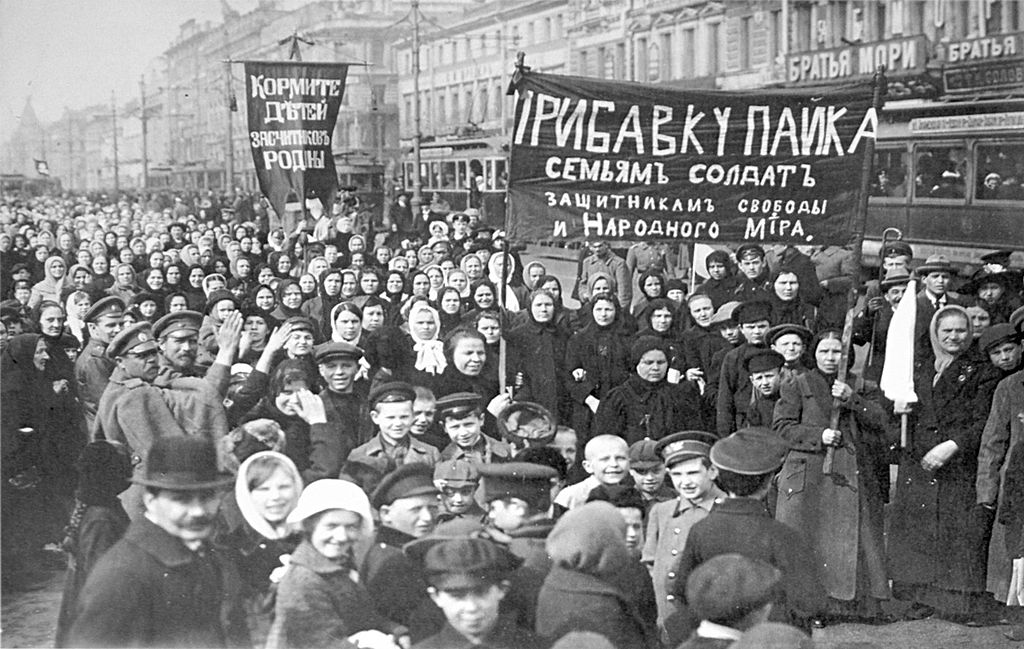
On this day 1917 (February 23rd on the Julian calendar), riots over food scarcity broke out in Petrograd (now St. Petersburg), Russia. The thousands protestors, perhaps as many as 500,000 refused to leave the streets, clashing with police. On March 11, the Petrograd army garrison were called to quell the protest. Some troops fired into the crowd, killing 200 protestors. In the following days, the majority of the Petrograd garrison joined the revolt, and Tsar Nicholas II was forced to abdicate on March 15. This marked the end of the Romanov dynasty and what many consider to be the beginning of the Bolshevik Revolution.
March 16, 1968: My Lai Massacre
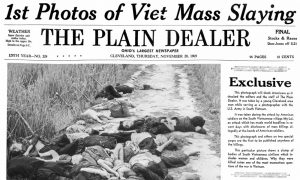
This day marks the sixtieth anniversary of the massacre of over five hundred men, women, and children by a company of American soldiers in the village of My Lai, South Vietnam. The brutality, later called “the most shocking episode of the Vietnam War,” was withheld from the American press for almost year, and incited international outrage upon publication. Once made public, the massacre, and its subsequent cover-up, intensified American antiwar sentiment during the Vietnam War.
March 21, 1943: Failed assassination attempt on Hitler
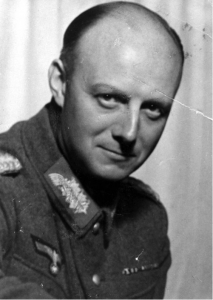
Henning von Tresckow, an officer in the German Army, helped organized German resistance against Adolf Hitler, who was believed to be disgracing the nation. On March 21st, 1943 Tresckow selected a fellow German officer, Col. Freiherr von Gersdorff, to assassinate Hitler while he visited a Museum in Berlin for Heroes’ Memorial Day. Gerdorff was to approach Hitler with bombs planted in his coat pocket, and detonate it killing himself as well as Hitler. However, once he arrived at the Museum, he found that Hitler was to only be there for a short eight minutes, which was no sufficient time for Gersdorff to execute the plan. Though the assassination plan failed, Gersdorff was not detected and escaped without consequence.
March 21, 1980: U.S. Moscow Olympics Boycott

On this day, President Jimmy Carter announced the U.S. boycott of the 1980 Olympic Games in Moscow following Soviet incursion into Afghanistan. The boycott, which marked the only modern Olympic Games in which the U.S. has not competed, did little to impact Soviet occupation of Afghanistan, and President Carter enjoyed limited support from the devastated athletes for his politicization of an international athletic contest.
March 22, 1972: Equal Rights Amendment passed by Senate
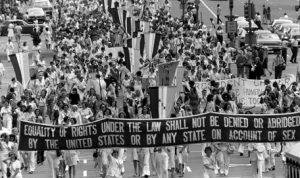
On this day, the U.S. Senate approved the Equal Rights Amendment, which legally prohibited discrimination on the basis of sex. The amendment passed in the House through the hard work of feminist trailblazers Betty Friedan, Gloria Steinem, and New York Representative Bella Abzug. The amendment, first proposed almost forty years earlier in 1923, did not secure ratification in the requisite thirty-eight states, and never came to fruition amidst the anti-feminist backlash of the 1970s. Gender equality is currently protected under individual state constitutions.
March 29, 1865: Appomattox Campaign Begins
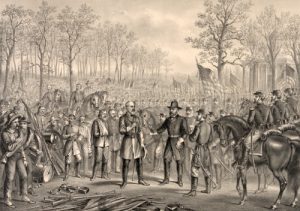
On this day in 1865, the final campaign of the Civil War begins in Virginia when Union troops under General Ulysses S. Grant move against the Confederate trenches around Petersburg. Lee’s army was dwindling in size to about 55,000, while Grant’s continued to grow–the Army of the Potomac now had more than 125,000 men ready for service. On March 29, Grant sent 12,000 men past the Confederates’ left flank, threatening to cut Lee’s escape route from Petersburg. Lee’s men could not arrest the Federal advance.
April:
April 3, 1865: Confederate Capital of Richmond is captured
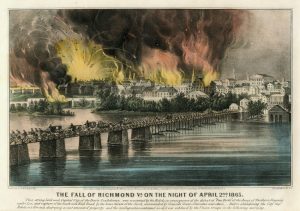
The Rebel capital of Richmond, Virginia, falls to the Union, the most significant sign that the Confederacy is nearing its final days. For ten months, General Ulysses S. Grant had tried unsuccessfully to infiltrate the city. On April 2, the Yankees struck all along the Petersburg line, and the Confederates collapsed. On the evening of April 2, the Confederate government fled the city with the army right behind. Now, on the morning of April 3, blue-coated troops entered the capital. Richmond was the holy grail of the Union war effort, the object of four years of campaigning. Tens of thousands of Yankee lives were lost trying to get it, and nearly as many Confederate lives lost trying to defend it. An observer wrote that as the Federals rode in, the city’s black residents were “completely crazed, they danced and shouted, men hugged each other, and women kissed.” Among the first forces into the capital were black troopers from the 5th Massachusetts Cavalry, and the next day President Abraham Lincoln visited the city. For the residents of Richmond, these were symbols of a world turned upside down. It was, one reporter noted, “…too awful to remember, if it were possible to be erased, but that cannot be.”
April 3, 1944: Supreme Court rules in Smith v. Allwright that African Americans cannot be barred from voting in Texas democratic primaries; violated 15th amendment
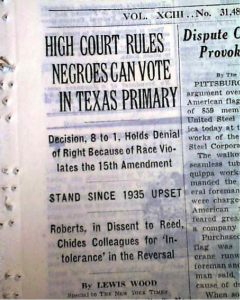
The 15th Amendment granted African-American men the right to vote and was adopted into the constitution in 1870. However, despite this amendment there were often policies that continued to disenfranchise African Americans, especially in Southern States. A resolution of the Democratic Party of Texas only allowed whites to participate in Democratic primary elections. S.S. Allwright, a county election official, denied Lonnie E. Smith, a black man, the right to vote in the 1940 Texas Democratic primary. The Supreme Court deemed the Democratic Party of Texas a “voluntary association,” but also argued that it conducted primary elections under state statutory authority. Therefore, not allowing African-Americans to vote in the primary elections was deemed unconstitutional. Even after this, it wasn’t until the Voting Rights Act of 1965 that barriers to voting for African-Americans were outlawed at the state and local levels.
April 4, 1968: Assassination of Reverend Dr. Martin Luther King, Jr.
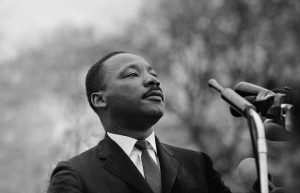
This day marks the fiftieth anniversary of the assassination of civil rights leader Reverend Dr. Martin Luther King, Jr. King employed peaceful protest in pursuit of equality for African Americans under the U.S. Constitution. Demonstrations such as the Montgomery Bus Boycott and the 1963 March on Washington helped to precipitate the Civil Rights and Voting Rights Acts, and King’s legacy of compassion and nonviolence endures as each generation is confronted with new forms of ignorance and discrimination.
April 6, 1917: US declared war and entered WWI
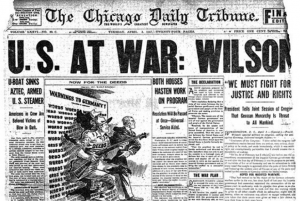
On April 2nd, 1917, President Woodrow Wilson requested a declaration of war against Germany before a joint session of congress. According to Wilson, Germany had violated its pledge to suspend unrestricted submarine warfare in the North Atlantic and the Mediterranean and attempted to entice Mexico into an alliance against the US, and thus the declaration of war was justified. The most problematic was Germany’s continual submarine attacks on passenger and merchant ships in 1917. The senate concurred on April 4th, and the House voted in support of the measure on April 6th.
April 9, 1865: Confederate General Lee resigns
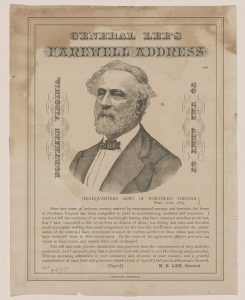
Confederate General Robert E. Lee surrenders his army to Union General Ulysses S. Grant at Appomattox Court House, Virginia. Lee’s army had little food, and they began to desert in large numbers on the retreat. When Lee arrived at Appomattox, he found that his path was blocked. He had no choice but to request a meeting with Grant. They met at a house in Appomattox at 2:00 p.m. on the afternoon of April 9. Grant offered generous terms. Officers could keep their side arms, and all men would be immediately released to return home. Any officers and enlisted men who owned horses could take them home. These terms, said Lee, would have “the best possible effect upon the men,” and “will do much toward conciliating our people.” The papers were signed and Lee prepared to return to his men. Although there were still Confederate armies in the field, the war was officially over. Four years of bloodshed had left a devastating mark on the country: 360,000 Union and 260,000 Confederate soldiers had perished during the Civil War.
April 12, 1861: Fort Sumter fired upon
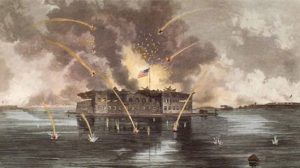
The American Civil War begins when Confederates fire on Fort Sumter in Charleston Harbor in South Carolina. After South Carolina seceded on December 20, 1860, the state demanded the fort be turned over but Union officials refused. A supply ship, the “Star of the West,” tried to reach Fort Sumter on January 9, but the shore batteries opened fire and drove it away. For both sides, Sumter was a symbol of sovereignty. The Union could not allow it to fall to the Confederates, although throughout the Deep South other federal installations had been seized. For South Carolinians, secession meant little if the Yankees still held the stronghold. The issue hung in the air when Abraham Lincoln took the oath of office on March 4, stating in his inauguration address: “You can have no conflict without being yourselves the aggressors.” The Confederates demanded surrender of the fort, but Major Robert Anderson, commander of Fort Sumter, refused. At 4:30 a.m. on April 12, the Confederate guns opened fire. For thirty-three hours, the shore batteries lobbed 4,000 shells in the direction of the fort. Finally, the garrison inside the battered fort raised the white flag. No one on either side had been killed, although two Union soldiers died when the departing soldiers fired a gun salute, and some cartridges exploded prematurely. It was a nearly bloodless beginning to America’s bloodiest war.
April 14, 1865: President Lincoln is shot
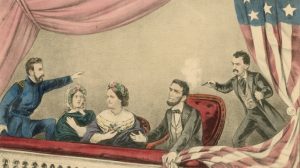
Confederate sympathizer John Wilkes Booth shoots President Abraham Lincoln at a play at Ford’s Theater in Washington, D.C. The president had recently visited the captured Rebel capital of Richmond, Virginia, and now Lincoln sought a relaxing evening by attending a production of Our American Cousin starring Laura Keene. At 10:15, Booth slipped into the box and fired his .44-caliber single-shot derringer into the back of Lincoln’s head. He shouted, “Sic semper tyrannis!” (“Thus ever to tyrants!”–the Virginia state motto) and ran from the stage. The stricken president was carried from the box to a house across the street, where he died the following morning. Booth was one of the most famous actors of his day, and Lincoln had seen him perform. He was a Maryland native with southern sympathies who hoped to aid the Confederacy by taking out the Union’s political leadership in one night. With Confederate president Jefferson Davis still free and General Joseph Johnston’s army still alive in the Carolinas, Booth thought the Confederate cause was not yet lost.
April 15, 1912: Titanic sank with 2,224 people on board; 1,500 drowned
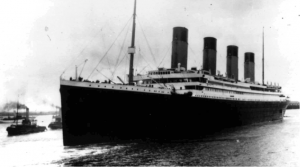
The British Ocean liner Titanic sinks into the North Atlantic Ocean on April 15th, 1912 after striking an iceberg. The Titanic, supposedly the safest liner ever built, was carrying 2,200 passengers, of which only 700 survived. The ship spanned 883 feet and had 16 supposedly watertight compartments, four of which could be flooded without causing a critical loss of buoyancy, which gave it the title of being the unsinkable ship. However, five of the compartments were ruptured by the iceberg, which caused the ship to begin sinking and eventually break in half. Part of the reason why there were so few survivors was that there was a shortage of lifeboats and lack of satisfactory emergency procedures, which later led to the first International Convention for Safety of Life at Sea in 1913.
April 28, 1945: Execution of Italian dictator Benito Mussolini
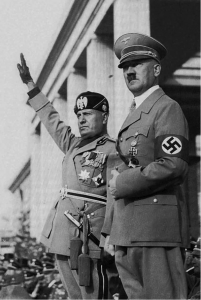
Italian fascist dictator Benito Mussolini attempted to flee Italy in a German disguise with his mistress as the Allied Powers closed in on Italy. He along with a convoy of fascists and German soldiers headed north towards Lake Como and the Swiss border, but partisans stopped the convoy and was recognized despite his disguise. Mussolini and his mistress were held in a small village overnight, driven to a small village, Giulino di Mezzegra in Italy, and executed by machine gun fire. The corpses of Mussolini and 14 fellow fascists were dumped like garbage in Piazzale Loreto in Milan, a symbolic public square for anti-fascists. Mussolini’s body was further abused by his opposes, who kicked, beat, spat at the body. One woman even shot 5 bullets at the dictator’s body. As the Soviets closed in on Berlin, Hitler found out about Mussolini’s death. Determined not to face the same fate, he committed suicide on April 20th in his bunker.
May:
May 5, 1970: Middlebury students go on strike
On the morning of May 5th, 1970, the Middlebury students began a week-long strike. The previous morning, the Ohio National Guard fired into a group of unarmed Kent State University students protesting the bombing of Cambodia by U.S. military forces, killing four and injuring nine others. Middlebury students joined 4 million others nationwide in striking. They had the goals of opposing the expansion of the war in Southeast Asia, mourning the death of the Kent State Four, and the reexamination of their collective and individual purposes. The week was characterized by teach-ins, rallies, protests, and meetings. The strike faced its biggest challenge on May 7th, after a former student burned down the ROTC building. However, the College Council decided to continue with the suspension of classes. The 1970 student strike was the high-water mark of protests over the Vietnam War, however groups of students remained involved in activism in the years and decades that followed.
May 9, 1960: FDA approves birth control pill
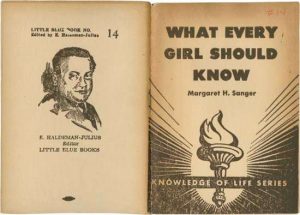
On this day, the American Food and Drug Administration approved the world’s first commercially produced birth control pill. Sex educator Margaret Sanger joined forces with suffragist and biologist Katherine McCormick, heiress to the McCormick family fortune, in order to commission the first oral contraceptive pill, inaugurating a new epoch of reproductive freedom for American women.